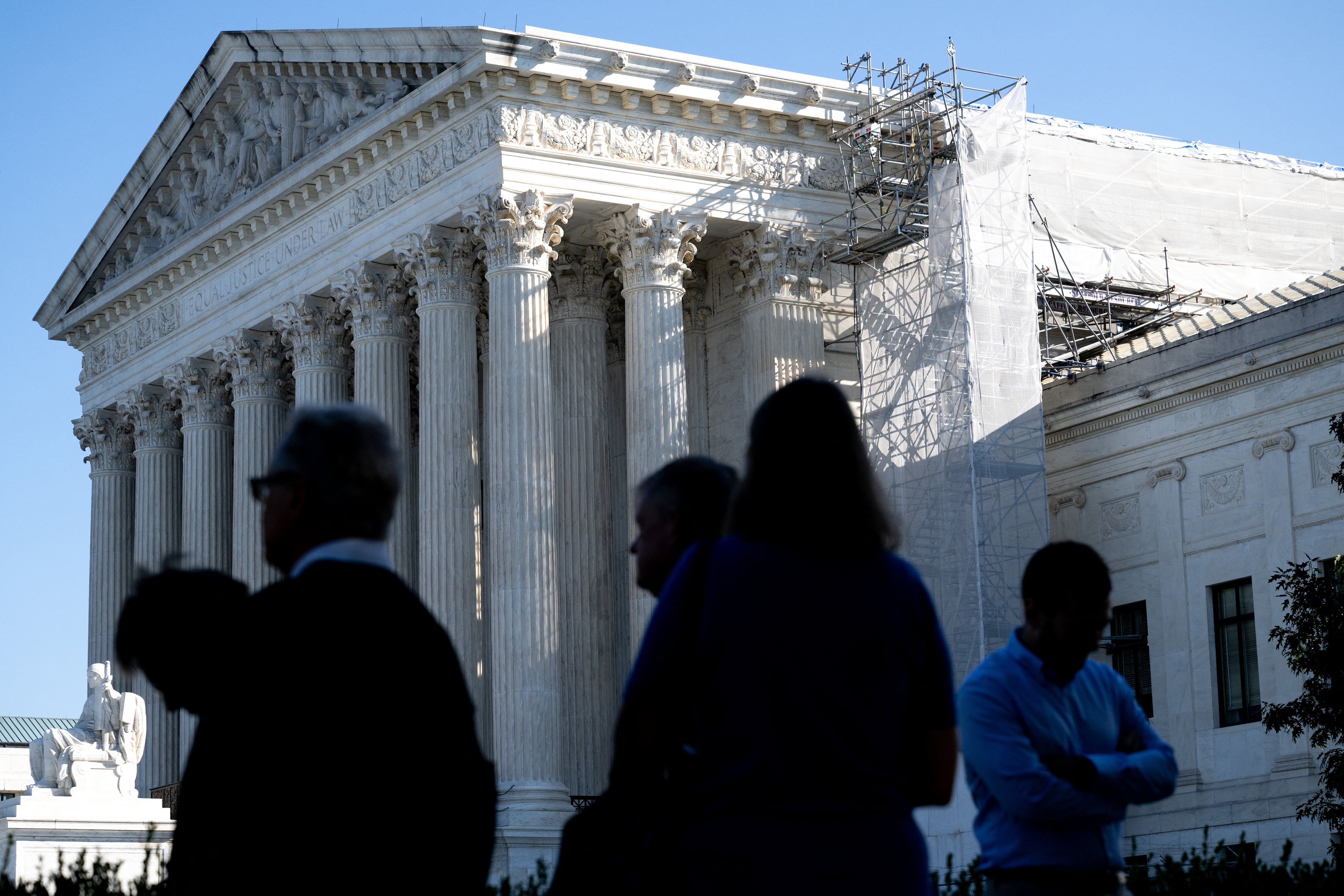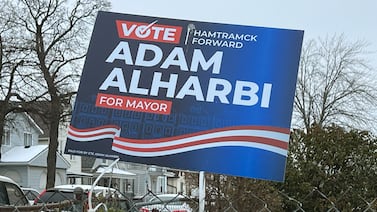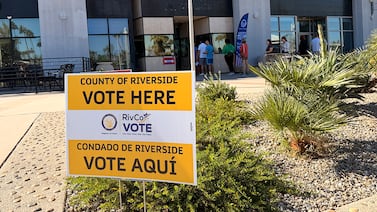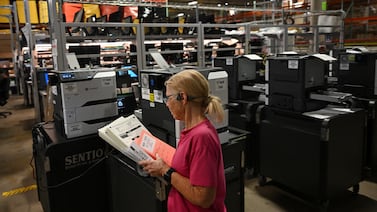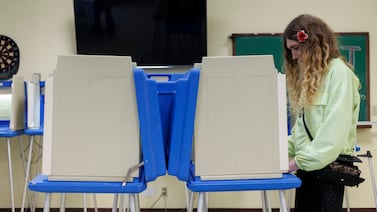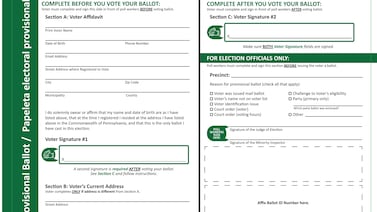Votebeat is a nonprofit news organization reporting on voting access and election administration across the U.S. Sign up for Votebeat’s free national newsletter here.
The U.S. Supreme Court ruled Wednesday that Virginia can remove roughly 1,600 voters it believes to be noncitizens from its rolls before next Tuesday’s election, even though federal law bans systematic cleaning of state voter rolls for 90 days before a federal election.
Justices issued a brief order granting Virginia’s emergency stay request and, as is typical in such instances, did not explain their legal reasoning. The order noted that Justices Sonia Sotomayor, Elena Kagan, and Ketanji Brown Jackson, all of whom were appointed by Democratic presidents, would have denied the state’s request.
The order is a high-profile, albeit temporary, win for Republican Gov. Glenn Youngkin, who called it “a victory for common sense and election fairness.” It will apply for this election in the state, but the case will go back to the lower courts.
The broader implications are harder to read, given that the justices didn’t say which of Virginia’s arguments prompted their ruling.
“We have a bare order that could have been on any number of grounds,” said Danielle Lang, senior director of voting rights at the Campaign Legal Center, which represented organizations suing Virginia. “I have no doubt that some folks will construct this as some sort of permission slip more generally. That’s not what we have, but that’s the problem when the court issues orders with no reasoning.”
Republicans have been aggressively promoting the idea that noncitizens could be illegally registering and voting in federal elections. Republican attorneys general in 26 states and the Republican National Committee had filed a brief in the case, supporting Virginia’s request to halt a lower court ruling that would have kept the voters on the rolls.
Experts have repeatedly said that instances of noncitizens casting ballots are extraordinarily rare, and stress that it is already illegal. Any noncitizen who votes is subject to criminal penalties and loss of their legal immigration status. Election officials who have conducted audits have publicly reported finding only a small number of scattered instances of it occurring.
In multiple states in recent months, including Virginia, Alabama, and Texas, authorities asserted they had found thousands of potential noncitizens on voter rolls, but the lists of affected registered voters appeared to include many citizens.
Voting rights lawyers had also sued Alabama for violating the so-called quiet period in federal law, the 90 days before a federal election when officials are not permitted to systematically remove names from voter rolls. A federal judge earlier this month ordered Alabama to reinstate affected voters, and Alabama has complied, said Lang, who also represented plaintiffs in that case.
Virginia points to DMV records as basis for removals
The Virginia case is rooted in an executive order that Youngkin issued in August, after the quiet period began. The state said it was removing registered voters who self-disclosed to the Department of Motor Vehicles that they were not citizens. But in its Supreme Court brief, the U.S. solicitor general said that the state “treated a voter as matching a potential noncitizen identified by the DMV based on as little as a shared ‘first and last name.’”
The U.S. Department of Justice and voting rights groups objected to the removals, saying that Virginia had violated the quiet period and that the driver’s license records could reflect incorrect or outdated information — for example, if someone had since been naturalized. The restrictions on removing voters during the quiet period are meant to ensure that any eligible voter who is mistakenly caught up in such an effort has time to remedy errors and make sure they can vote, they argued.
Some conservative groups that focus on elections, including the Honest Elections Project, which had filed a brief supporting the state in the case, said Virginia should be allowed to proceed. “Every illegal ballot disenfranchises a lawful voter,” Jason Snead, the director of the Honest Elections Project, said in a statement after the ruling.
Voting rights groups stressed that Virginia has same-day registration, and eligible voters affected by this should be able to reregister at the polls and vote in Tuesday’s election. It is expected to affect around 1,600 people.
During the Knight Election Law Forum Wednesday, election lawyers said they were surprised by the Supreme Court’s ruling in the case. Benjamin Ginsberg, a longtime Republican election lawyer, noted that the court’s oft-cited Purcell Principle warns against getting involved too close to the election.
“It certainly does telegraph that the issue of noncitizen voters on the rolls will be part of post-election litigation if this is a close election,” Ginsberg said.
The lawyers agreed it wasn’t clear why the court ruled for Virginia. Bob Bauer, a former White House counsel during the Obama administration, noted that Virginia’s removals rested on somewhat individualized instances where a voter had given information to the state as part of the driver’s license process, as opposed to a systematic process affecting the broader voter rolls. “There is some question about what it means for purging generally, and I don’t think that should be overstated,” he said.
Lang and others pointed out that the election is in six days, many states have laws that also govern how and when voters can be removed from the rolls, and it’s not clear that election officials can feasibly alter their approach for this election.
Virginia removals part of wider GOP effort against noncitizen voting
Republicans around the country have been drawing attention to noncitizen voting as an election administration issue. Earlier this year, former President Donald Trump said congressional Republicans should shut down the government unless Democrats agreed to pass stalled GOP legislation that would institute proof of citizenship requirements for people registering to vote. Congress ultimately passed short-term funding for the government without attaching the proof of citizenship bill.
The fate of other efforts will be decided in the courts. Several states have also been singling out the U.S. Department of Homeland Security, saying the federal agency isn’t doing enough to help them check the citizenship status of some registered voters. Texas, Florida, and Ohio so far have sued DHS over the dispute.
In the lawsuits, the Republican-led states all argue that the federal government is refusing to turn over required information to help them verify the citizenship status of registered voters, and that the solution DHS offers them is inadequate.
The filings follow a legal road map set out by the Trump-aligned America First Legal Foundation in June, when the group sent top election officials in all 50 states a letter instructing election officials to submit requests to DHS, asking the agency to verify citizenship when there are “reliable indicators that a voter may not be a U.S. citizen.”
DHS already provides a way for states to verify someone’s immigration status. The Systematic Alien Verification for Entitlements program, or SAVE, allows states that agree to certain terms the opportunity to check people’s immigration status. Those terms include providing any individual who is not verified as a U.S. citizen through SAVE the opportunity to show documentation of their U.S. citizenship.
The database search requires users to have a “unique DHS-issued immigration identifier” to search, and state officials say they don’t have that in voting records. The program also charges fees for use. The lawsuits, by Texas Attorney General Ken Paxton and others, assert that DHS must provide the information in some other way. In letters to state officials preceding the filing of the lawsuits, the agency says it can’t do that.
“There is no database of individuals existing in the country. That’s not a thing,” said Justin Levitt, a Loyola Law School professor and former White House senior policy adviser for democracy and voting rights in the Biden administration. Levitt said that even if the system did exist, the federal law mandating a quiet period means election officials couldn’t use the information until after the election anyway.
Paxton, Levitt said, “is demanding access to a system that does not exist…. and he is demanding it at a time when it cannot be used for the purpose he says he wants to use it for, and that’s what makes the demand nothing more than a publicity stunt.”
Other experts agreed. “It’s not actually clear to me that there’s a way for the federal government to give them what they want,” said Sean Morales-Doyle, director of the Brennan Center for Justice’s voting rights program.
Testifying at a Texas state Senate hearing earlier this month, Ken Cuccinelli, a former acting head of DHS in the Trump administration who now heads the Election Transparency Institute, said the SAVE database isn’t user-friendly, but “it is the best record of noncitizens present in the United States that we have.”
Carrie Levine is Votebeat’s managing editor and is based in Washington, D.C. She edits and frequently writes Votebeat’s national newsletter. Contact Carrie at clevine@votebeat.org.

